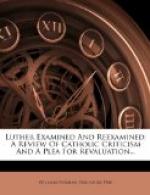His rebellious spirit found nourishment in these humiliations.
Owing to his melancholy temperament and gloomy fits,
he made no friends. He felt himself misunderstood
everywhere. Even the little season of sunshine
that came into his young life at the Cotta home in
Eisenach did not cure him of the morbid feeling that
nobody appreciated him. He began to loathe the
studies which he was pursuing in accordance with the
wish of his father. To certain occurrences, like
the slaying of a fellow-student, an accident with
which he met on a vacation trip, and a sudden thunderstorm,
he gave an ominous interpretation which deepened his
despondency. At last he determined, “inconsiderately
and precipitately,” to enter a cloister.
His friends “instinctively felt he was not qualified
or fitted for the sublime vocation to which he aspired,
and they accordingly used all their powers to dissuade
him from the course he had chosen. All their
efforts were fruitless, and from the gayety and frolic
of the banquet” which he had given his fellow-students
as a farewell party “he went to the monastery.”
He was so reckless that he took this step even without
the consent of his parents. “He knew little
about the ways of God, and was not well informed of
the gravity and responsibilities of the step he was
taking.” “He was not called by God
to conventual life; . . . he was driven by despair,
rather than the love of higher perfection, into a
religious career.” Catholics feel so sure
that they have a case against Luther that in all seriousness
they ask Protestants the question: Did he act
honestly when he knelt before the prior asking to
be received into the order?
Luther has later in life given various reasons for
entering the monastery. His case was not simple,
but complex. One reason, however, which he has
assigned is the severe bringing up which he had at
his home. Hausrath is satisfied with this one
reason, and many Catholic writers adopt his view.
But this remark of Luther is evidently misapplied
if it is made to mean that Luther sought ease, comfort,
leniency in the cloister as a relief from the hard
life which he had been leading. Luther had grasped
the fundamental idea in monkery quite well: flight
from the secular life as a means to become exceptionally
holy. He sought quiet for meditation and devotion,
but no physical ease and earthly comforts. He
knew of the rigors of cloister-life. He willingly
bowed to “the gentle yoke of Christ”—thus
ran the monkish ritual—which the life of
an eremite among eremites was to impose on him.
His hard life in the days of his boyhood and youth
had been an unconscious preparation for this life.
He had been strictly trained to fear God and keep
His commandments. The holy life of the saints
had been held up to him as far back as he could remember
as the marvel of Christian perfection. Home and
Church had cooperated in deepening the impressions
of the sanctity of the monkish life in him. When
he saw the emaciated Duke of Anhalt in monk’s




